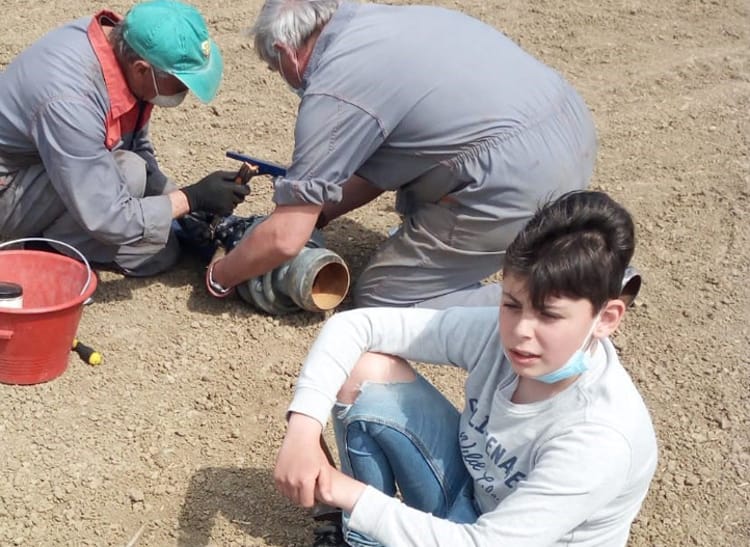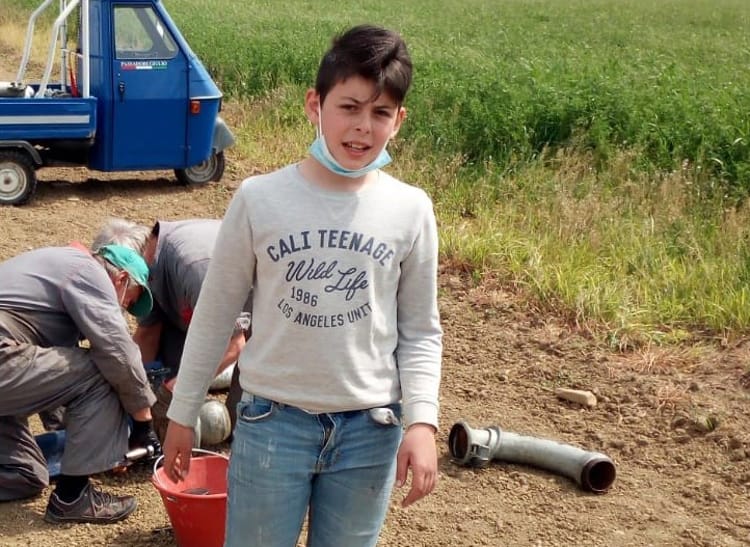Farming in the Time of Corona: A Tale of Inspiration and a Lesson Learned
Quarantined at home for almost two months, my family and I have found comfort in fresh produce and foods more than ever now. I have found myself experimenting in the kitchen with varieties of sizzling salads, and mountains of red ripe tomatoes with our national comfort food, pasta. Homemade pesto sauce, grilled veggies and fresh orange juice are almost always on our family table. All these help to take the stress and pressure away and bring the sunshine of the field to our small apartment.
The challenging ride from field to fork
My family is not alone in our culinary routine. In these difficult times, people around the world find comfort in simple food, healthy fruit and fresh vegetables. But getting this produce from the field to the fork has become a real challenge during the pandemic. With lockdown orders in place across the world, perishable produce cannot be transported to their destination countries for sale. The purchase of agricultural products for commercial use has also nearly stopped, as most restaurants have been closed and some farmers have been forced to feed their ripe produce to their livestock. Importers are struggling with logistics, and with less international trade taking place, there are also less refrigerated containers available and less cargo flights to transport the produce. The market for fresh foods is unstable and volatile.
Then again, despite all these difficulties, throughout the world, farmers have not stopped growing food. They have proven once again, that growing food is more than just a job but also a responsibility that they take very seriously. They have not given up and they keep working very hard so that we can keep finding comfort in having fresh healthy food on our table.
Here is the story of farming in the times of Corona through the lens of two resilient farmers.
Vitamin C around the clock in Spain
Antonio Lopez lives with his wife and daughter in Valencia. He has been growing citrus fruit on a 1000-hectare farm for over 20 years and mentoring local farmers for many years. As the Corona pandemic spread around Spain, people’s wish to boost immunity by taking extra vitamin C has created a high demand for citrus products. Antonio and other citrus growers in Valencia have worked around the clock to supply far greater quantities of citrus fruit than they normally would. Antonio even bought a new truck so he could transport more fruit to market.
A workforce shortage due to quarantine and travel restrictions has been another obstacle for Antonio. “We have the land and everything is growing well,” Antonio explains “the real challenge is harvesting and transporting it.” But with everybody committed to the task of growing food and keeping the farm going, Antonio and his workers meet the challenge head on, or as Antonio says: “Operating the farm with less than 50% of the regular workforce means we all have to work round the clock including weekends, so we do!”
Antonio is committed to the health of his friends and workers, he wouldn't want anyone to get sick so he has been abiding by the strict protection measures established by the government. He bought masks for everybody at work, and allows just one worker in the tractor at a time instead of two which further increases the workload.
Despite the uncertainty Antonio is optimistic “In my 20 years as a grower we have encountered many challenges, but we kept growing food. This is our legacy as farmers and no virus can take it away from us.”

A family’s DNA of resiliency in Italy
Miles away, in Italy, Giorgio Passadori lives in a family farm, a family business since 1947. Together with his wife and 11-year-old son (who lends a hand in the fields), he grows primarily onions, basil, durum wheat, soft wheat and chickpeas on a 120-hectare farm.
The greatest difficulties Giorgio encounters these days are transport and seasonal labor. Being so close to the epicenter of the virus his workforce was heavily depleted early on. The industry has been dependent on seasonal jobs for many years, and benefitted from a large number of foreign workers. But now these workers are not allowed to come to Italy.
Talking to Giorgio, the word “uncertainty” keeps resurfacing. Farmers need to produce a certain amount of crops to break even. If they don’t, they can’t make ends meet. If they produce enough, but can’t harvest it and deliver it to market, the produce rots. One way or another, this new reality forced by the pandemic is complicating Giorgio’s decision making and the farm’s operation.
But, Giorgio is as motivated as ever. He says that his family farm is the result of generations of hard work. His father and uncles handed it over to him 40 years ago and there has never been a dull moment! “Over the years, I had to reinvent myself many times and I did. We are very resilient, we never give up, and we don’t lose track of our mission - to produce food.”
When asked about the future, Giorgio said, “We need to be able to adapt quickly to the changing reality; form new synergies and alliances, create a direct link between the farmer and large retailers, and operate a dynamic and lean company which is capable of responding to the needs of the market and the environment, during a crisis like this.”
Farmers like Antonio and Giorgio inspire us. They face huge changes in their businesses through shifting demand, changing routes to market and labor restrictions, yet they keep waking up every morning, seven days a week to do their job and put food on our plate. We’re honored to work with them, support them and help them prevail through these challenging times. Power to all fellow farmers worldwide!

A virus-induced revolution for a sustainable future
Inspiring stories of how farmers win against all odds have been told since farming began and while they never stop to amaze me, I always think - what will this crisis change about the way we consume fresh produce, the way we grow it, and the way it is delivered to our table?
It seems that everyone these days is talking about the resiliency of our local food chains. Customers understand the need for locally grown food. Governments understand that if they want to facilitate local food production, they will have to support farmers. Farmers begin to welcome the benefits of technology and automation to reduce dependency on manual labor and develop new routes to market in the form of ecommerce.
Overall, local food security has been in the spotlight and we have all had a wakeup call. Just like Giorgio, we now realize that it is not just farmers who have to be able to adapt quickly to the changing reality, we all do. And if all the players in the food chain; farmers, consumers, governments and corporations embrace this lesson, we’ll be able to meet, head on, whatever comes next, and guarantee a sustainable food chain.


